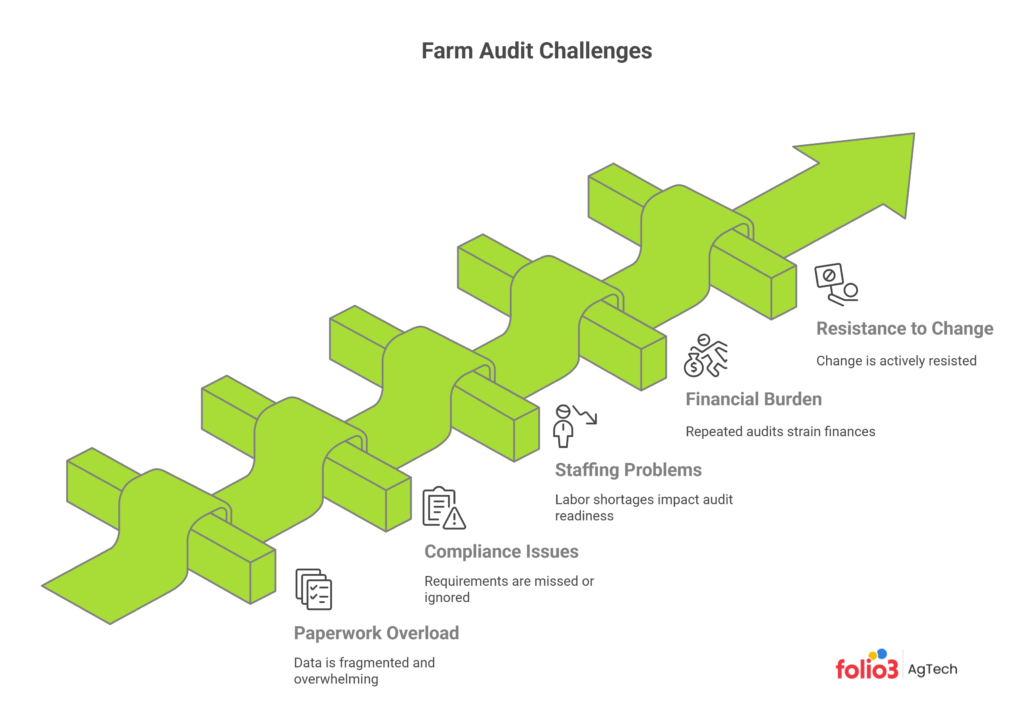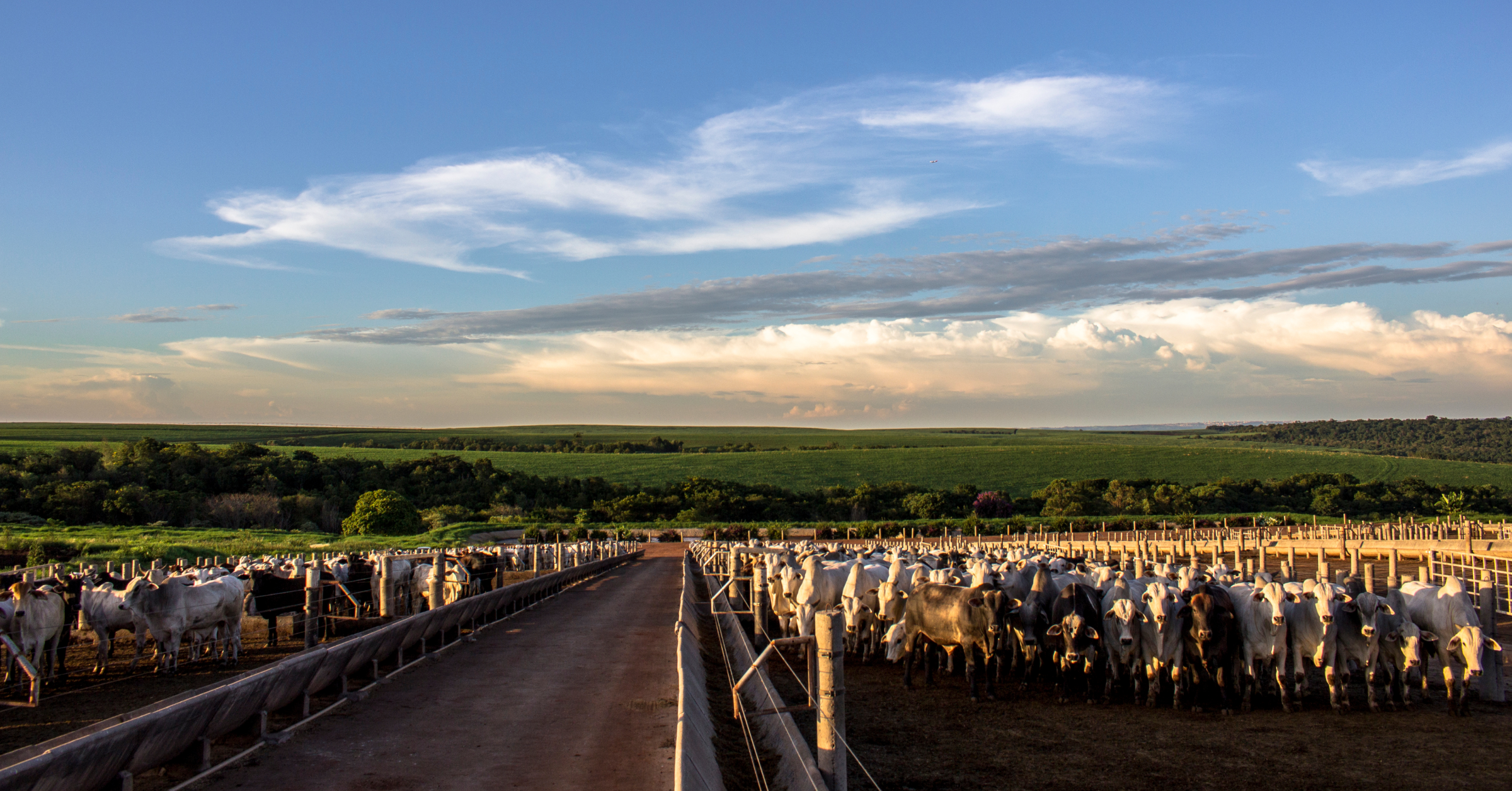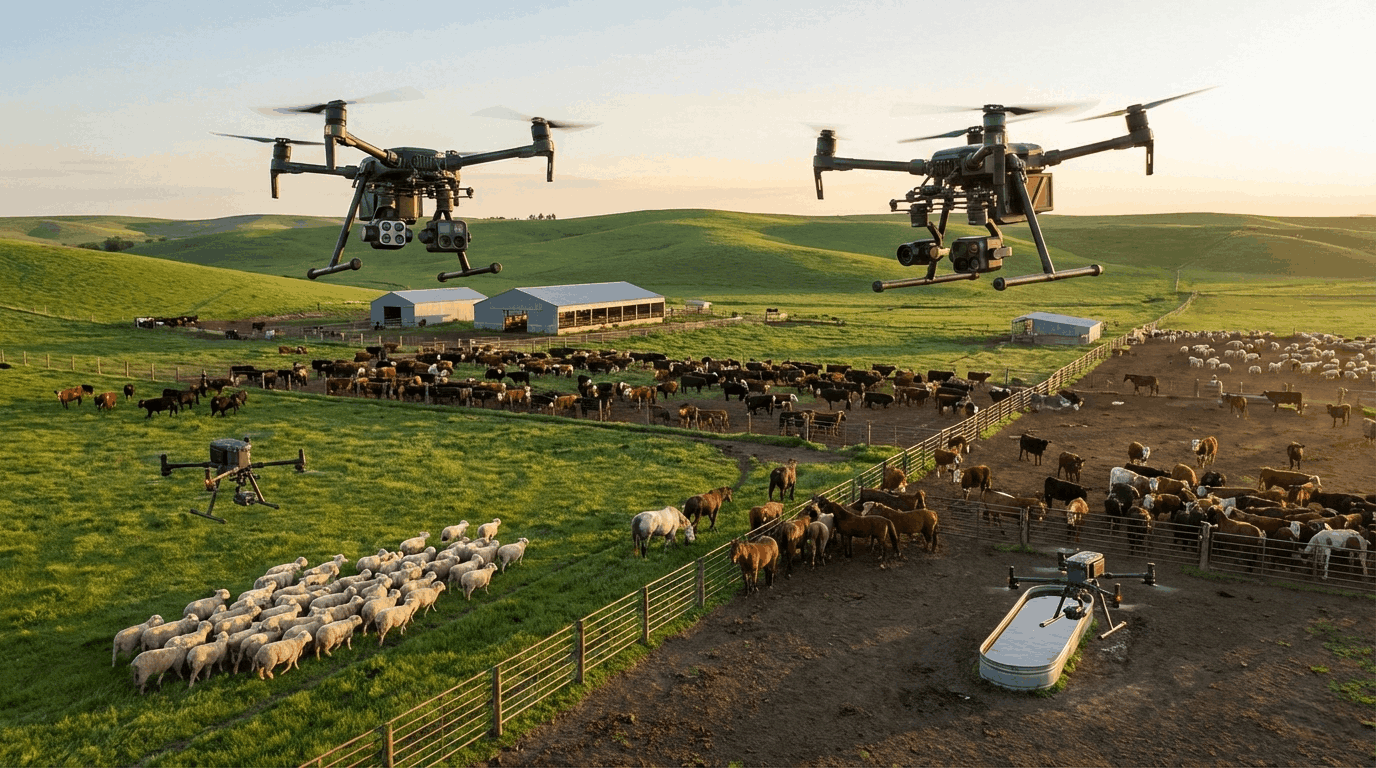Modern farms operate under more scrutiny than ever before. From food safety regulations to sustainability reporting, agricultural businesses are expected to prove that their operations are safe, efficient, and compliant. This is where a farm audit comes in.
A farm audit is a structured review of farming practices that measures performance against legal requirements, industry standards, and buyer expectations. It examines areas such as environmental impact, food safety, worker welfare, and financial accountability. For farm managers and decision makers, an audit is both a compliance tool and a practical way to identify inefficiencies that affect profitability.
The need for thorough auditing has increased as consumer awareness grows and supply chains tighten. Third-party audits are voluntary, but buyers often require them to ensure produce safety and reduce the risk of contamination in farm-food supply chains. Missing requirements can result in penalties, lost supermarket contracts, or reputational harm. On the other hand, farms that use audits effectively can demonstrate transparency, protect market access, and strengthen their sustainability record.
This article explains what a farm audit is, outlines different types of audits, highlights best practices, explores common challenges, and reviews how digital farm audit tools can simplify the process while keeping compliance on track.
What is a Farm Audit?
A farm audit is a structured evaluation of a farm’s operations to ensure compliance with legal requirements, industry standards, and buyer expectations. It examines practices across food safety, environmental management, labor conditions, and financial accountability, giving a clear picture of a farm’s performance and highlighting risks and areas for improvement.
The main goals of a farm audit are compliance, transparency, efficiency, and sustainability. Compliance audits verify adherence to regulations such as FSMA 204, labor laws, and environmental standards. Transparency demonstrates responsible practices to buyers and certification bodies. Efficiency-focused audits identify operational bottlenecks and reduce resource waste, while sustainability audits promote long-term, eco-friendly farming practices.
Audits benefit farms of all sizes. Small and medium farms gain guidance on best practices and preparation for certifications, while larger farms manage complexity across multiple locations, commodities, and staff, minimizing risks of non-compliance or supply chain disruptions, as it helps with the supply chain tracking in agriculture.
There are several types of audits that we’ll be discussing further ahead in the blog. These audits provide a holistic approach, helping farms maintain high standards, meet market expectations, and operate sustainably. A structured farm audit program strengthens trust with buyers, consumers, and regulatory authorities, ensuring operational reliability and long-term success.
Types of Farm Audits
Farms rely on various types of audits to ensure smooth operations, compliance, and sustainability. Understanding these audits helps farmers identify risks, improve farm efficiency, and maintain trust with buyers and regulators.
Environmental Audits
Environmental audits focus on assessing a farm’s impact on natural resources. These audits review sustainability practices, resource management, water and soil usage, and chemical inputs. The goal is to reduce environmental footprints while promoting responsible farming practices. Sustainability audits are increasingly important as consumers and certification bodies prioritize eco-friendly operations.
Compliance Audits
Compliance audits evaluate a farm’s adherence to regulations and industry standards. This includes food safety farm audits, animal welfare requirements, labor law compliance, and Good Agricultural Practices (GAP). Compliance audits are essential for farms looking to sell to large retailers, export produce, or participate in certification schemes, as they demonstrate reliability and transparency.
Operational Audits
Operational audits examine the efficiency of farm workflows and internal processes. These audits cover areas such as resource allocation, harvest management, workflow efficiency, and record-keeping. Operational audits help farms streamline processes, reduce waste, and maintain consistent quality across all activities.
Financial Audits
Financial audits assess the farm’s economic health. They review financial accountability, profitability, budgeting, and resource allocation. Accurate record-keeping and monitoring reduce risks of mismanagement and improve decision-making. Farmers can also integrate tools like farm accounting software to enhance audit accuracy, ensure traceability, and simplify reporting.
GAP Audits
GAP audits (Good Agricultural Practices) evaluate farms against industry standards for food safety, sustainability in agriculture, and worker welfare. These audits are often required for certifications and export compliance. GAP audits provide a structured framework for farms to maintain consistent quality, meet regulatory standards, and strengthen market access.
By conducting these audits regularly, farms can achieve transparency, operational efficiency, and compliance while fostering sustainable practices that benefit both the business and the broader agricultural ecosystem.
Farm Audit Process: Step by Step
A systematic approach to farm audits ensures accuracy, compliance, and actionable insights. Following a clear structure not only helps farms meet regulatory and buyer requirements but also minimizes the risk of missed details. With the right preparation, the audit process can shift from being a burden to a valuable tool for continuous improvement.
Preparation
The first step involves defining the audit scope and gathering all relevant farm records. This includes crop logs, equipment maintenance data, labor schedules, and financial statements. Proper preparation helps auditors understand the farm’s operations and ensures no critical evidence is overlooked. Leveraging farm record-keeping software can simplify this step by centralizing all data in one accessible location.
On-Site Inspection
During the on-site inspection, auditors evaluate day-to-day operations, workflow efficiency, compliance with regulatory requirements, and sustainability practices. This stage often includes observing storage and handling procedures, verifying equipment functionality, interviewing staff, and assessing environmental practices in real time. Accurate record-keeping is essential here to cross-check observations with documented practices and ensure consistency across all operational areas.
Documentation and Reporting
After inspection, auditors compile findings into detailed reports. Documentation highlights both areas of compliance and gaps that need attention. Digital record systems allow farms to automatically generate reports and link evidence to audit criteria, increasing accuracy and reducing manual errors.
Follow-Up and Corrective Actions
Finally, farms must act on audit recommendations. This involves implementing corrective actions, monitoring their effectiveness, and updating processes to prevent recurring issues. Tracking these actions digitally ensures accountability and provides evidence for future audits, improving overall operational resilience.
By following this structured audit process and integrating farm record-keeping software, farms can reduce errors, streamline compliance, and maintain transparency for internal and external stakeholders.
Common Challenges in Farm Audits
While farm audits are essential for compliance and efficiency, farms often face several hurdles that can make the process difficult. From paperwork overload to meeting complex buyer and certification demands, even well-managed farms can struggle to keep everything aligned. These challenges not only increase the risk of errors but can also impact profitability and market access if not addressed proactively.

Paperwork Overload and Fragmented Data
Managing large volumes of records manually can be overwhelming. From crop logs and labor schedules to environmental and financial documentation, fragmented data increases the risk of errors and omissions. Farms without centralized systems may struggle to provide auditors with complete and accurate evidence, leading to delays and additional workload.
Missed Compliance Requirements
Failing to meet regulatory or buyer-specific requirements can carry serious consequences. Missed documentation for sustainability reporting, supermarket contracts, or third-party certifications can result in penalties, loss of market access, and reputational damage. Even minor oversights can create compliance gaps that affect long-term business relationships.
Labor Shortages or Untrained Staff
Audits require knowledgeable personnel to prepare, present, and implement corrective actions. Farms facing labor shortages or lacking trained staff may find it challenging to maintain consistent audit readiness, increasing the likelihood of errors and non-compliance.
Financial Strain of Repeated Audits
Conducting audits regularly, especially with manual processes, can be costly. Fees, time spent on preparation, and disruptions to daily operations add up, particularly for small to medium farms. Without digital tools to streamline the process, repeated audits can strain both budgets and staff resources. In many cases, farmers also face hidden costs such as hiring external consultants, training staff to stay updated on compliance standards, or managing penalties for minor errors. Over time, these recurring expenses not only limit profitability but also reduce the farm’s ability to reinvest in new technology, sustainability initiatives, or workforce development.
Resistance to Change
Implementing new audit practices or adopting digital audit tools can face internal resistance. Long-standing habits and reluctance to move away from paper-based processes often slow down efficiency improvements and delay the benefits of streamlined audits.
Addressing these challenges proactively through proper planning, staff training, and leveraging farm audit software can significantly reduce errors, save time, and ensure compliance, making audits less burdensome and more productive.
Best Practices for Farm Audits
Adopting best practices ensures that farm audits are not only compliant but also efficient and productive. A structured approach helps farms identify gaps early, reduce risks, and build confidence with regulators and buyers. By focusing on preparation and consistency, audits can become a valuable tool for long-term growth instead of a stressful obligation.
Keep Detailed and Organized Farm Records
Accurate and up-to-date documentation is the backbone of any successful audit. Maintaining thorough farm record keeping for crops, labor, equipment, and resource use simplifies audit preparation and ensures nothing is overlooked. Going beyond the basics, records should also track corrective actions and long-term improvements. Digital farm record systems can further streamline this process by centralizing all data in one location and making it accessible during audits or inspections.
Build and Use a Farm Audit Checklist
Creating a standardized checklist ensures all audit requirements are met consistently. A well-structured checklist serves as a guide for both internal and external audits, reducing the likelihood of missed compliance points and speeding up the audit process. Updating the checklist regularly to reflect changing standards or buyer requirements keeps the farm audit-ready at all times. This proactive approach turns audits into a continuous improvement cycle rather than a one-time event.
Train Staff on Compliance and GAP Standards
Your team is the first line of defense for compliance. Regular training ensures staff understand food safety regulations, labor laws, and Good Agricultural Practices (GAP) standards. Beyond compliance, training fosters a culture of accountability, responsibility, and ownership. Knowledgeable employees can identify potential issues early, report risks promptly, and maintain audit readiness even when external auditors are not scheduled. Ongoing refresher sessions also help staff stay aligned with evolving regulatory requirements and industry best practices.
Conduct Regular Internal Farm Audits
Internal audits allow farms to identify gaps and correct them before external auditors arrive. Routine checks help maintain compliance, improve operational efficiency, and reduce stress during official audits. These internal reviews also encourage collaboration across departments, as teams must align their practices and share data openly. Over time, this builds a stronger foundation of transparency and trust both within the farm and with external stakeholders.
Leverage Digital Farm Audit Tools
Modern farm audit software can save time, reduce errors, and improve overall efficiency. Tools help track corrective actions and integrate real-time operational data. Using digital solutions ensures evidence is easily accessible, audit workflows are streamlined, and regulatory compliance is consistently maintained. Many platforms also provide dashboards and automated reporting, which simplify communication with auditors and buyers, while reducing the workload for managers.
By following these best practices, farms can transform audits from a burdensome task into a strategic tool for compliance, operational improvement, and sustainable growth.
Benefits of Regular Farm Audits
Regular farm audits provide more than just compliance; they create long-term value for farms by reducing risks, improving operations, and strengthening market opportunities.
Ensures Compliance and Reduces Risk
Routine audits ensure farms meet regulatory standards, food safety protocols, and labor requirements. They also help identify and address potential hazards through safety audits. Tools like farm equipment maintenance software are particularly useful, as they track machinery upkeep and reduce the chances of safety-related incidents that could result in penalties or downtime.
Improves Efficiency and Profitability
By examining workflows, audits highlight inefficiencies and areas where resources can be better managed. This not only reduces waste but also lowers production costs. For farms aiming to improve margins, practical strategies like these align closely with proven tips to cut costs and stay profitable on the farm.
Strengthens Sustainability Credentials
Sustainability is no longer optional in modern agriculture. Audits that track soil use, water management, and waste reduction allow farms to demonstrate sustainable practices. These records build credibility with eco-conscious consumers and help meet the reporting standards of buyers who prioritize responsible sourcing.
Builds Transparency With Buyers and Stakeholders
In today’s market, transparency is a competitive advantage. Audits create a clear record of compliance, sustainability, and operational performance. This level of visibility reassures buyers, investors, and regulators, strengthening business relationships and improving market access.
Regular farm audits, when treated as a proactive management tool rather than a compliance obligation, can safeguard farm operations while opening doors to growth and profitability.
How Folio3 Agtech Helps Simplify the Auditing Process
Digital farm audit tools are transforming how audits are conducted, making them faster, more accurate, and less stressful for farmers. Instead of dealing with scattered paperwork and manual reporting, technology centralizes information and provides real-time insights.
Folio3 Agtech offers solutions tailored for modern farms, including mobile forms for on-site data collection, automated reporting for quicker reviews, and cloud-based data storage to keep records accessible and secure. Together, these tools eliminate redundancies and help farms stay audit-ready at all times.
The benefits go beyond efficiency. Digital audits enhance transparency for stakeholders, simplify sustainability audits, and reduce the time and costs tied to traditional methods. They also strengthen compliance with food safety and buyer standards, ensuring farms can meet growing regulatory and market expectations. By unifying compliance, operations, and reporting, farms gain both confidence and clarity during the audit process.
With the right digital support, farm audits become less of a burden and more of a business advantage, a point that leads directly into the importance of viewing audits as strategic opportunities, not just obligations.
Conclusion
Farm audits are no longer just about ticking compliance boxes. They are central to building efficient, transparent, and sustainable agricultural operations. From ensuring food safety and meeting buyer requirements to strengthening consumer trust, regular audits give farms the structure they need to thrive in a competitive and highly regulated environment.
While the process can feel complex, digital solutions are making it easier than ever to stay on top of audit demands. Platforms like Folio3 Agtech help farmers move past paperwork by offering mobile-based audits, automated reporting, and connected tools that integrate with core operations. This not only reduces the time and cost of audits but also turns them into actionable insights for long-term growth.
By approaching audits as a strategic opportunity rather than a burden, farms can safeguard compliance, improve efficiency, and prepare for the future of agriculture with confidence.
FAQs
What Is Farm Auditing?
Farm auditing is the process of evaluating different aspects of a farm’s operations, including compliance, efficiency, sustainability, and financial practices. It ensures farms follow regulations, maintain transparency, and meet both market and consumer expectations.
What Are the Three Main Types of Audits?
The three main types of farm audits are compliance audits, operational audits, and financial audits. Each serves a different purpose, from checking food safety standards and resource management to assessing overall financial health.
Do Farms Get Audited?
Yes. Farms are regularly audited to verify compliance with government regulations, industry certifications, and buyer requirements. These audits help ensure food safety, animal welfare, and sustainable practices.
How Much Does a Field Audit Cost?
The cost of a field audit varies depending on the type of audit, farm size, and certification requirements. Smaller farms may spend a few hundred dollars, while larger or specialized audits can cost several thousand dollars.





